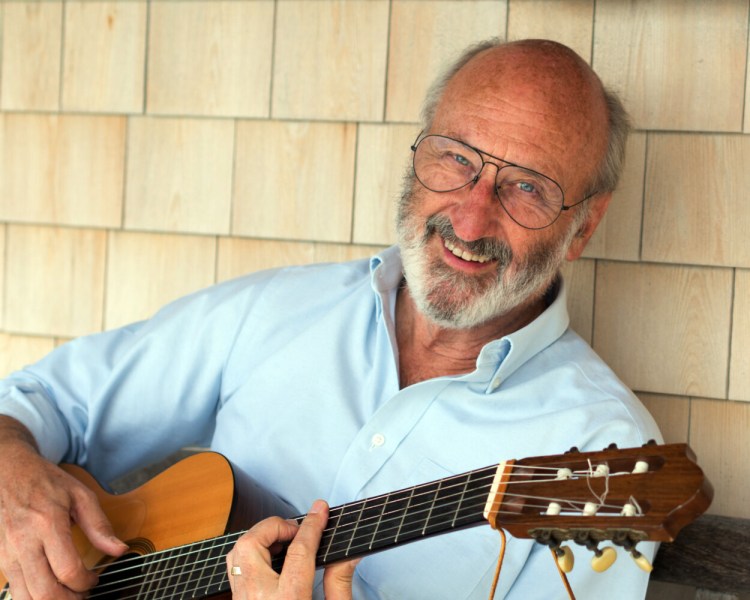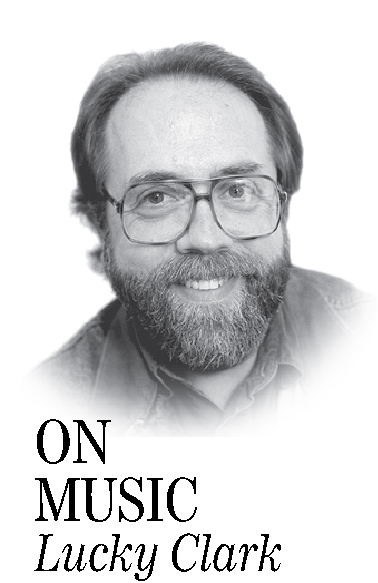Late last month I learned that Noel Paul Stookey was a participant in a virtual concert with the Portland Symphony Orchestra as part of its 2020-21 POPS! Series, unfortunately it was held Oct. 17, so I figured I’d missed a golden opportunity to reconnect with one of the principle members of Peter, Paul & Mary. Then I discovered that that program had been taped and can be viewed until Nov. 17, so on Oct. 27 a hastily-scheduled interview was conducted with an old friend to find out more about the performance and how he was doing during this pandemic. I reached him at home in Blue Hill and began by asking …
Q: How are you doing?
Stookey: Ah, you know, I’m happy not to have a mask on while I’m at home. I forget sometimes after I’ve been out in public that when I get back that it’s okay to kiss my wife. It is weird.
Q: It certainly is. It’s been seven months like never before, that’s for sure. Well, the reason I’m calling is that you recently performed with the Portland Symphony Orchestra and that the resultant taping will be available for awhile. Could you talk about that?
Stookey: Sure, and all of this is on-the-record so you can start recording any time. I did encourage MPBN to videotape the making of the PSO event because, to me, the drama or the interesting part, even if I wasn’t a musician, would be to see how on earth 20 people can get together in an empty auditorium that can seat 2,600 people and make sense of an hour’s program worth of music. Nick Woodward indicated a kind of interest and said he would mention it, but it never got done.
Q: What would one have seen if it had been taped by MPBN?
Stookey: To begin with, I think there is an audience for a behind-the-scenes look, and to underline my opinion, to me, the most engaging part of the PSO event was the fact that we, as an audience, could look over the shoulder of the violinist, we could see the expression on the clarinetist and on the English Horn player. These were intimate moments that we could not otherwise, sitting in the hall, been able to see. And the installation of the arbitrary screens between the players that depend on their breath for playing, the masks that were worn in all of the interim interactions between the people on the stage, the intros to an empty hall. I just think it would have been a fascinating piece of documentary, but they didn’t go for it.
Q: You’re right, it was a great opportunity missed. How did the performance go?
Stookey: It went smoothly but for two songs, the symphony saved (me).
Q: How so?
Stookey: I don’t know if the average layperson can understand this but once a performer has a piece under their fingers they tend to do it more or less the same way, and/or if they make a break in it, it may become the way in which they perform later versions of it. So the period of time that had elapsed between the writing down of my songs that I was going to do with the symphony into a score and the current Noel Paul Stookey presentations was sufficient on two of the tunes, so I was totally at a loss to match what the orchestra was doing. Now, there’s 17 of them sitting down in front of their music stands, they’ve got these dots in front of them and they know exactly what that means (chuckle), and they play to that. I’m out in front saying to myself, “Let’s see, did it add a bar here? No, I didn’t add a bar!” So, on two of the tunes, I just had to drop out my guitar and let the orchestra carry me because I couldn’t remember what I had done two years ago, three years ago, four years ago in that particular section. Fortunately, I still had a voice and the voice was strong enough that I could hang in there even if I have to sing an extra-long bar to cover up the mistake that I was making on the guitar.
Q: (Chuckle) Now that does sound nerve-wracking.
Stookey: Well, Lucas (Richman) is a phenomenal conductor, at least from my layman’s point of view, who is able to bridge not only the technical requirements of the orchestra but to make comfortable the halting expressions from the lead performer.
Q: Now this took place at Merrill Auditorium, correct?
Stookey: Yes.
Q: And there were 17 members of the PSO present?
Stookey: Roughly speaking, I think that’s true, yes. Plus Lucas, plus the three of us: two of the local boys. Michael Burd on bass and Michael McInnis, a keyboard player who lives in Portland, who join me. So there were four plus 17, 21 total I think on stage, plus a raft of cameras, and every one of the musicians had to be miked separately because they were all separated by at least 6 feet, sometimes 8 feet, and the screens. So, the ability to mix the sound fell on the shoulders of the electronics engineer as opposed to the natural acoustics of the hall, so a great deal of technology was involved.
Q: How long will this concert be available for folks to see?
Stookey: It’s going to run for a month, from the 17th of October to Nov. 17th, and I don’t think $10 is an unreasonable amount of money to spend to hear this beautiful music. A lot of it is Copeland as well as an original piece by Lucas and five or six pieces by myself including “Blowin’ In The Wind” from the Peter, Paul & Mary catalogue.
Q: Just out of curiosity, have you been doing anything else during this pandemic?
Stookey: Well, I’m in the process of preparing for the album I was going to be recording this summer and, in a sense, I’m kind of glad to have the extra time to work on it.
Q: Does this new project have a title yet?
Stookey: Yes, it’s called “Fazz: Now and Then” and the term “fazz” came about when Peter, Paul & Mary toured in the mid-70s with the Dave Brubeck Quartet opening, I mean, it was a dream come true for me. Because of Dave’s inclination toward playing within a classical form he was led to perform a song with us, the Quartet and I and Peter and Mary worked out an arrangement of “Because All Men Are Brothers” which was a rewrite of St. Matthew’s Passion with lyrics by Tom Glazer. It was recorded on a Dave Brubeck album, but on this particular tour the opportunity then, as is the wont of folk musicians was, “Hey, let’s do it together on stage!” Well, I don’t know if you’re familiar with the natural aversion of jazz musicians to folk music (chuckle), they tended to think of folk music as being hillbilly: Three chords and a banjo, so with great reluctance Paul Desmond accepted the role of introducing us on stage for that song in front of a crowd. He said, “And now we’re going to bring some people up on stage and I don’t know whether to call it ‘fazz’ or ‘jolk’!” And then we’d do the song together.
Q: (Laughter)
Stookey: (Laughter) I knew instinctively which one he was calling it, but the term ‘fazz’ stuck with me, and I wasn’t about to call my new album “J-O-L-K”! I’m going to make it a double album reaching back into the songs that I did when the trio was active like “Whatshername” or “The Lady Says She Don’t Like Jazz,” some of the tunes performed in the context of the trio and others I performed solo. And then there’ll be a companion CD of the newest material that I’ve worked up.
Q: Any idea when it’ll come out?
Stookey: It was supposed to come out this summer but I plan to have it out a year from now, in October of 2021.
Q: Is there anything, Noel, that you’d like me to pass on to the folks reading this article?
Stookey: Well, just to say “Stay safe and stay sane.”
Lucky Clark has spent over 50 years writing about good music and the people who make it. He can be reached at luckyc@myfairpoint.net if you have any questions, comments or suggestions.
Comments are not available on this story.
Send questions/comments to the editors.



